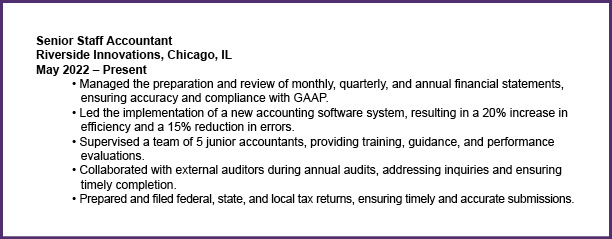The same way a skill can add value to your resume, an irrelevant one can diminish it. It’s time to hone in on the pieces of your experience that best reflect your professional career —down to every word, number, and achievement. If you want to increase your chances of moving forward in the interview process, here’s what to leave off your resume.
Cut Information That Isn’t Relevant
Including too much information on your resume could lose the recruiter’s attention. Eliminate jobs from your resume that aren’t relevant to maximize space. Lead with strong points that make you a valuable candidate for the role. When writing your bullet points, lead with action verbs and elaborate on your achievements using facts and statistics.

Remove Your Objective Statement
Career objectives are a thing of the past — especially for executives. When applying to a role, the objective is already implied. Instead, lead with a career summary that serves as an introduction to your applicable achievements. Prioritize relevance and brevity when drafting a compelling career summary.
Save Your Headshots for Another Day
Unless you’re applying for a role in a feature film, keep your headshots on LinkedIn. Leaving out your photo gives you more real estate to expand on your skills. Another option is to highlight your portfolio, publications, or relevant coursework.
Don’t Include Personal Details
Employers legally aren’t allowed to ask for personal information during an interview, so there’s no need to include it on your resume. Avoid sharing details about your age or marital status, for example. Some employers may ask where you’re based if the role has a location requirement, but opt to only add the city, state, and zip code where you live.
Say Goodbye to Fancy Formatting
Since rich formatting impacts readability for applicant tracking systems (ATS), it’s best to stick with simple fonts and formats. Include fonts that are legible, professional, and attractive like Arial, Cambria, and Times New Roman. Resume margins can also make a difference: learn how to set your margins now.
Don’t List Too Many Soft Skills
When listing too many soft skills on your resume, you can lose credibility. Find the sweet spot of including two to three soft skills that are suitable for the role. Instead, demonstrate soft skills during your next job interview using the STAR method to show vs. tell.
Just remember, there’s a great position out there waiting for you! Keep refining your resume for impact and the right job will show up. Start searching now.
Did this article add value to your job search? Keep reading to take your career a step further: new rule banning non-competes, high-income skills worth learning, and questions to ask at the end of an interview.
Searching for your next dream career? See which employers are hiring near you:













